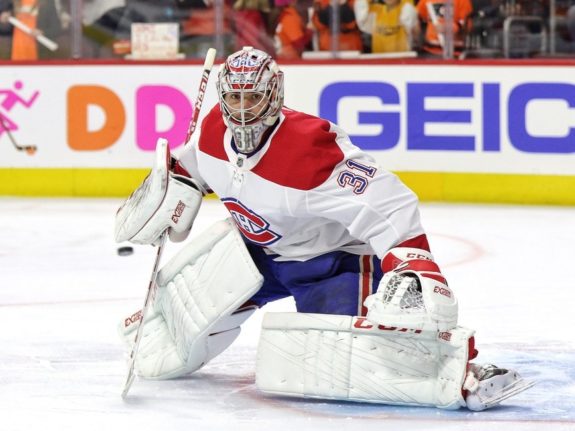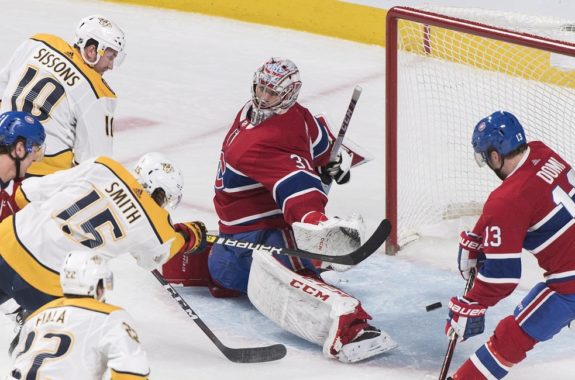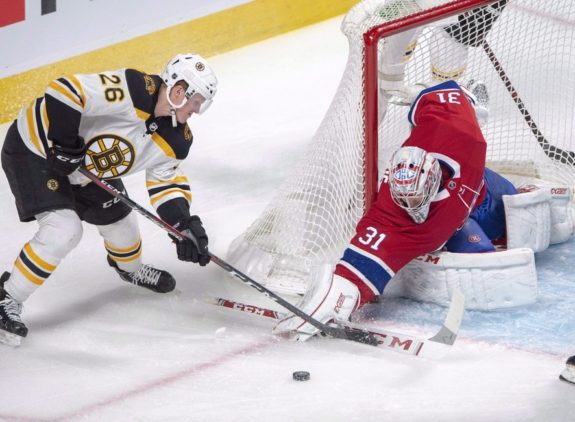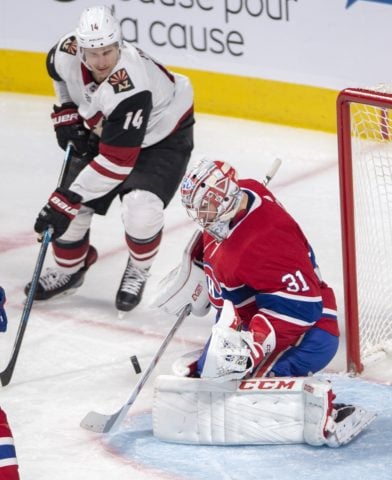The Montreal Canadiens entered the 2019-20 season with expectations to further improve upon a stellar 25-point improvement in the 2018-19 campaign, ultimately still being disappointed due to missing the playoffs by only two points. General manager Marc Bergevin went into the summer with work to do on the blue line and at the backup goaltender position in hopes that these fixes would help provide the two missing points.

At 32 years of age, starting goaltender Carey Price could benefit from a season where he could focus on his game without the distractions from the media or the constant worry he would have to carry the team as he did last season, playing 25 of the last 26 games. Playing in Montreal, a franchise in rebuild mode, he may never have an opportunity for that type of season.
Price Doesn’t Want to Babysit
“I just want a guy that I can relate to; obviously, as a goaltender, you’re going to relate to whoever your partner is in some aspect,” Price told Arpon Basu of The Athletic before NHL free agency began on July 1 (from ‘‘I don’t want to wait’: The Canadiens’ conflict between the present and future is quickly coming to a head,’ The Athletic, 06/30/2019). “But I feel like I’m pretty compatible with whoever I’m matched up with. I’m pretty easy going in that regard,” he continued. “But it’s nice to have a guy that you don’t have to babysit or anything like that. I don’t really want to be a mentor at this point. I want a guy that I can work with.”
The implication was that Price didn’t want to mentor Charlie Lindgren, who was signed to a three-year, $750,000 per season contract extension in 2018 to be Price’s backup.

These comments may have played a role in the signing of 30-year-old veteran Keith Kinkaid to a one-year, $1.75-million deal. In his short time in Montreal, Kinkaid amassed a 1-1-3 record and a woeful .875 save percentage (SV%). Reportedly, management felt Kinkaid needed to regain his confidence, and he was then waived to allow him to play more in Laval. This left Price to shoulder the burden of having to play at his very best every night to keep a rebuilding team in the playoff hunt.
An Aloof Attitude
Price is an introvert. He keeps his fiery side to himself and offers the media a more polished persona. He is as competitive as they come and, despite his reputation as a calm and collected goaltender in games, he has been known to react by breaking sticks in practice when he doesn’t get the results he desires.
His frustrations can boil over and become a distraction. For a team that has several young players still learning to be professionals, these distractions may slow their progress. Which would be detrimental to the rebuilding process.
After a difficult overtime loss to the Pittsburgh Penguins at home on Jan. 4, a loss that stung even more after Brandon Tanev’s controversial overtime goal, Price was a no show for his usual post-game scrum, which has led to criticism from an always fiery media market in Montreal. (from ‘In the Habs’ Room: Carey Price hides from the media after loss to Penguins,’ Montreal Gazette, 01/05/2020)
Is his response a surprise? It shouldn’t be. Price would have known his anger could get the better of him and lead to a poor response, perhaps even a criticism of the officiating that would lead to a fine. Sometimes discretion is the better part of valour as Price was able to regroup and face the media immediately after a loss to the Winnipeg Jets on Jan. 6.

Price is an elite goaltender with the hardware to back it up. He has won a World Cup of Hockey, Olympic and World Junior Championship gold medals, a Calder Cup, as well as many individual awards, including the Hart and Vezina Trophies. All that being said, he is on the wrong side of 30 and his window to win a championship is closing.
Will Price Stay?
Price’s stated desire to not be a babysitter, coupled with the mounting frustration from several non-playoff seasons in a row, may cause him to rethink his desire to remain in Montreal long term. The fact that, at 32 years old, Price has carried his team for a decade and is no closer to the Stanley Cup than the day he arrived, and the team is still rebuilding, will have to be a source of some frustration. If his desire is to win, leaving now, when the team is in transition and unlikely to be a contender until 2021 or 2022, may be his best chance at a ring.
That being said, if management finally decides to make him available for a trade, and receives a reasonable offer, they will need to approach him as he holds a complete no-movement clause (NMC). This gives him complete control of his own destiny. In the end, players want to win, and moving to a current contender could be his best chance.
What Is Price’s Value?
Any team adding Price’s $10.5 million cap hit until 2026 would need to offload a goaltender and a high cap hit. The Canadiens could absorb both as they would need a starter for the short term to platoon with Lindgren until the heir apparent, Cayden Primeau, is ready to take on the role as an NHL starter. They could also use another veteran skater to help eat minutes and mentor young players.
The key to any contracts Montreal acquires will be term; if the contract(s) is three years or less they can absorb it without an impact to the long term the cap structure. Any longer and it can have an impact on the future cap structure as big-name prospects such as Jesperi Kotkaniemi, Nick Suzuki, Ryan Poehling are two to three years away, respectively, from proving they deserve big-money deals.
Goaltenders, even of Price’s reputation, don’t have the kind of value some might expect. Fans may hope for multiple high-end assets, however, a more realistic return they should be prepared to see, is one quality asset to help push the rebuild forward. No matter what is decided, it will be a difficult choice for the Canadiens to move on from one of the winningest goaltenders in team history.

Modernizing the team’s cap structure would be another motivating factor for Montreal. In the cap era, no team has won the Cup with a goaltender as their top earner. The formula is to have a star center, a star defender and solid goaltending. The cap structure of Cup-winning teams has heavily favored top line and top pairing players above a goalie.
Is it time for Montreal to move on from Price? Perhaps, but that decision will ultimately belong to him. Will the frustration of losing and having to be relied upon as a leader push him to choose to leave? Whatever happens in Montreal, Price will have to make a difficult choice. Either he chooses to go to a contender now and takes his shot at a Stanley Cup, or, he gambles on the Canadiens’ rebuild being finished in time for him to do so before he retires.